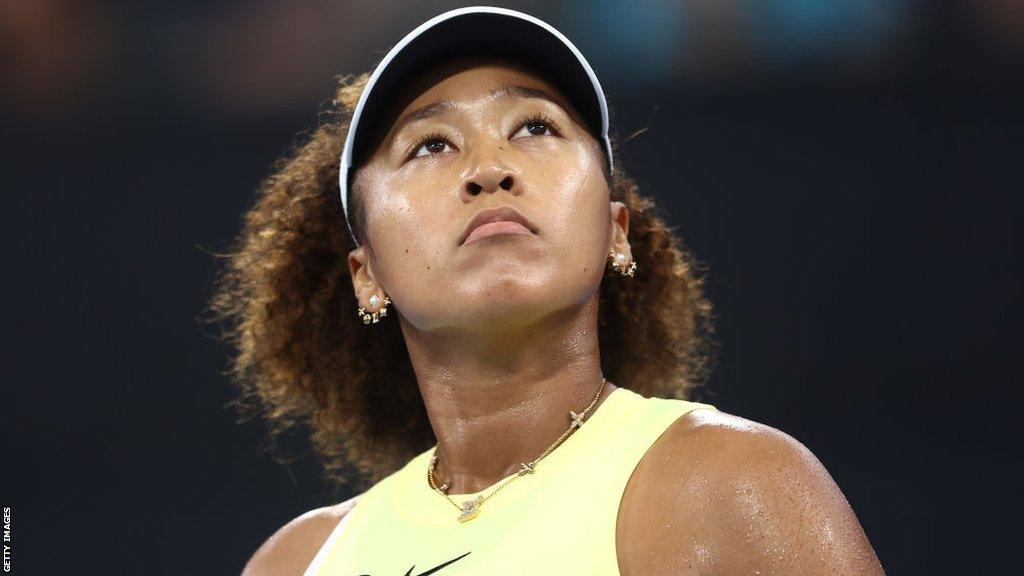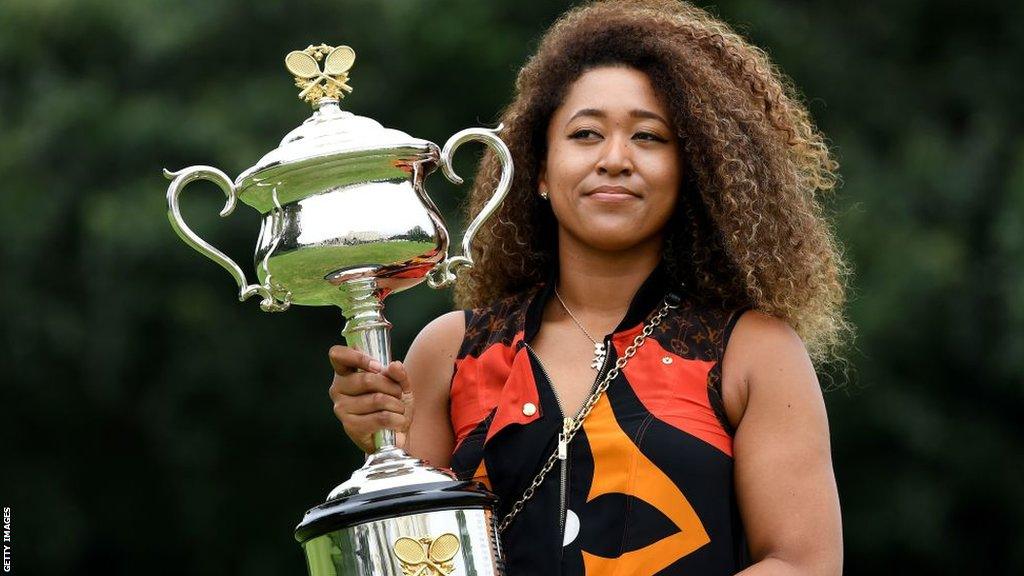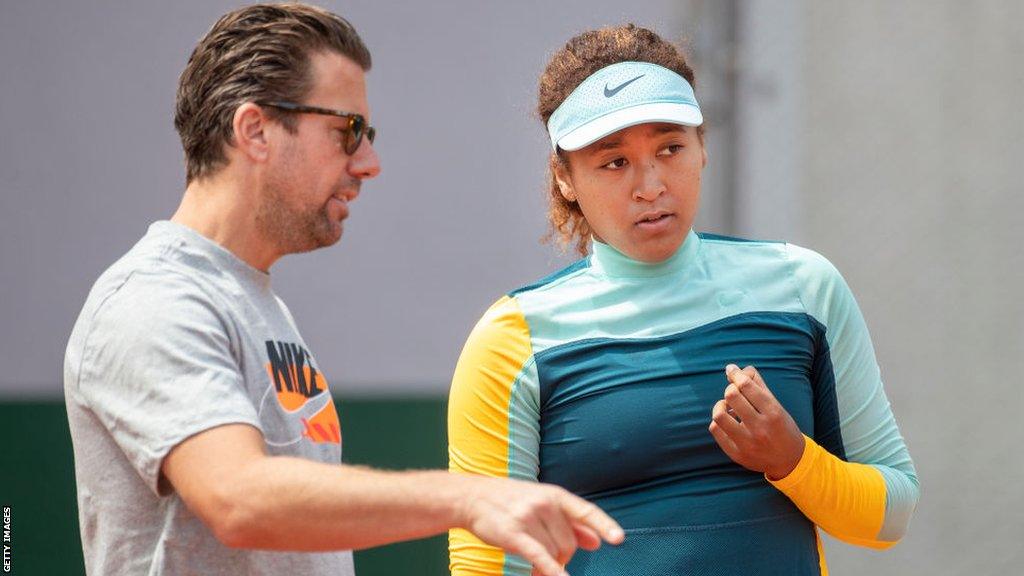Naomi Osaka and her team talk about the former world number one's long-awaited comeback
- Published


Osaka is making her return to tennis at the Brisbane International after 15 months away
Sign up for notifications to the latest Insight features via the BBC Sport app and find the most recent in the series.
At a family dinner to celebrate her 22nd birthday, Naomi Osaka turned to her mother to ask whether she thought her daughter would have achieved more by this point in her life.
Tamaki Osaka shook her head.
"Or do you think this is acceptable?" the birthday girl followed up.
"More than acceptable," was the reply.
When that exchange was captured by a Netflix mini-series,, external Osaka was already a two-time Grand Slam champion and world number one.
What we did not know then was that Osaka had been suffering "long bouts of depression" since winning her first Grand Slam title at the US Open in 2018.
There have been two more Grand Slam titles to enjoy since that birthday celebration, but also some painful months to endure.
Osaka was questioning her direction in the sport in the autumn of 2022 when she fell pregnant.
Shai was born in July and, in an interview to mark her return to the tour after a 15-month absence, Osaka told BBC Sport the arrival of her daughter has "completed" her as a person.
"I almost kind of needed her in my life," she explained in Brisbane.
"I'm the type of person that can't really think about myself. I make rash decisions and she's helped me mature so much already. I'm a lot more comfortable with who I am and I'm just very thankful for every day.
"To know there's a tiny human who loves me no matter what, and my days just light up because of her, that kind of completes me as a person as well."

Shai's birth was not straightforward, as the umbilical cord became wrapped around her daughter's neck during the delivery.
While pregnant, Osaka suffered with morning sickness - her first real experience of "throwing up". The nausea was only relieved by eating plain crackers, but that came at the cost of weight gain which was already preying on her mind.
And despite Osaka's history of depression - which she detailed for the first time after pulling out of the 2021 French Open - she was caught off-guard by the stealthy onset of post-natal depression.
"I did get affected by it. I don't think I knew at the time - I just thought it was a big transition," she said.
"But I was lucky. My mum was there, so she helped me out a lot, but it's a very dramatic change.
"There was a period of time when everything felt very hectic.
"I'm fine now and actually I'm much better than I was before - I feel really calm and relaxed."
Those around Osaka appreciate the importance of keeping things that way.
Belgian coach Wim Fissette worked with Osaka when she won the 2020 US Open and the Australian Open the following January. They parted in July 2022, only to reunite in October this year.
"It's always a tough topic, but I need to be careful in the past months where she has been training non-stop," Fissette said shortly after Osaka won her first-round match against Tamara Korpatsch at the Brisbane International.
"Starting tournaments, it's going to be important for us to give her, at the right moments, time off - to switch really off.
"On the other hand, the communication from her to the team has become better - she's much more open than before. She's better now at communicating how she feels."
Becoming a mother during an on-court career is refreshingly normal on the WTA Tour these days.
Angelique Kerber returned from maternity leave at this week's United Cup and Petra Kvitova used the first few minutes of 2024 to announce she and her husband Jiri are expecting a baby in the summer.
"Becoming a mum made me realise how strong I am, and how strong all mums are," Osaka said.
"I also want mums to feel like they are capable of anything, because I think they are."

Osaka's most recent Grand Slam title was the 2021 Australian Open, where she beat American Jennifer Brady in the final
But Osaka, one of sport's most powerful voices on social issues, is also anxious to point out that new mothers should not for a moment compare themselves to her, only six months after childbirth.
Not many mothers have either the physical training she has endured or the logistical help that she enjoys.
"It was very difficult - honestly almost impossible if I didn't have the people around me," Osaka said with a laugh.
"I don't think new mums should look at me and think that this is realistic.
"I have had to plan my day by the second, so after I train I just sprint to my car and go and see Shai.
"Every person's body is different. For example, 30 minutes after I gave birth they wanted me to be wheeled around, but I told them I felt completely fine to walk. It was a bit weird because I had to demonstrate that I could walk.
"I learned a lot about the human body but the core was fascinating because I couldn't even sit up out of the bed - I had to roll out of my bed."
The man responsible for that physical strengthening is Florian Zitzelsberger. The German has previously worked with Kvitova and Kevin Anderson, and briefly with Osaka in 2022.
As well as a strength and conditioning coach, Zitzelsberger is also an osteopath with a keen interest in nutrition.
"When you have an ACL (anterior cruciate ligament) rupture or an ankle strain, you have healing weeks; you have a clear protocol," he explained.
"With giving birth it's totally different. The core has to be destroyed because the core, the pelvis, is just made for creating a baby.
"The first question I wanted to know was how she feels as a mother. I just saw the sparkling in her eyes that she's just super happy.
"When we came to the question of ambitions, and how much motivation she has, she just said she wants to use every minute she has now to get back there and make her daughter proud.
"Just these few sentences showed me that she's really ready to do the hard work again and conquer the tour again."

Osaka and Fissette (left) have come back together for her return after a spell of nearly three years together between 2019 and 2022
Osaka says she did not watch the Australian Open or the French Open in 2023 as it would have made her realise what she was missing.
She confirmed her intention to return to the professional game during September's US Open and pledged to design a busier schedule than has been typical for her in the past. When the really hard work began the next month, Fissette duly detected a significant change in her.
"The last time I saw her was around July 2022, when we stopped working together, and I honestly really didn't know where her career was going to," he said.
"When I spoke to her again this year in September, she already sounded like a new person. And a person with a lot of strong ambitions.
"I've never seen her this way before where she was so hungry to learn. She was such a happy person on the court and the last weeks she has worked so hard and with so much discipline.
"I would say she was definitely the ideal player."
Fissette says Osaka has always been good at scheduling, so a typical training day runs from 8am until 3pm, with the late afternoons reserved for time with her daughter.
The familiar sight of her slapping her left thigh before a crucial point was in evidence once again as she beat Korpatsch in her first match back, but the long-term goal is to create an even better version of Osaka - a better athlete and more powerful player with greater variety.
She has stated her desire to compete more strongly on clay and grass, and greater exposure to these surfaces can only help in that development.
Osaka says winning future Grand Slam titles and representing Japan in the Olympics would be wonderful, but that it is more important to "cherish" every tournament she plays.
She wants to be able to travel the world with her daughter and make her appreciate there should be no barriers to her own ambitions.
How quickly could success come for Osaka? She has travelled to Australia without Shai, and she would surely not be here if she did not believe she can cut it with the best players in the world.
"That would be a disservice to myself and also the people who want to see me play," was her reply.
"I can't really say whether I'm going to do amazing or not, but I feel pretty good with where I'm at right now and I'm pretty competitive."
Asked about Osaka's chances at the Australian Open, Fissette said: "I will always see her as a possible winner, but I am also realistic.
"She is always a candidate. I cannot predict results, but I will promise you that she will be a better tennis player than she has ever been before. For sure."
Listen to Naomi Osaka's interview with BBC Sport, along with Andy Murray and Rafael Nadal, on 5 Live Tennis at 21:30 GMT on Tuesday.
If you have been affected by any of the issues raised in this story you can visit BBC Action Line.

Test your knowledge of obscure words: Take the ridiculously difficult rare words quiz
How Conan Doyle came to resent his iconic creation: Lucy Worsley explores an extraordinary love-hate relationship
